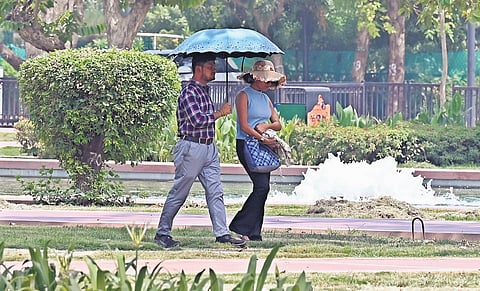

NEW DELHI: The national capital remained on red alert amid a persistent heat wave, with maximum temperatures reaching up to 45.2 degrees Celsius in some parts of the city on Thursday.
The India Meteorological Department (IMD) issued a red alert owing to the intense heatwave. The Safdarjung observatory recorded a high of 43.9 degrees Celsius, four degrees above normal, and a minimum of 30.7 degrees Celsius, 2.7 degrees above normal.
The Ridge and Ayanagar areas also sizzled at 44.2 degrees Celsius, while Mungeshpur was the hottest at 45.2 degrees Celsius. No rainfall was recorded across the capital, and humidity levels fluctuated between 39% and 73%, adding to the discomfort.
According to the IMD’s daily forecast, hot and humid weather will persist on June 13, with maximum temperatures expected between 41 and 43 degrees Celsius. Winds from the south and southeast at 10–20 kmph may offer slight respite. However, parts of the city could witness thunderstorms, light rain, or dust storms accompanied by gusty winds up to 60 kmph later in the day.
IMD officials attribute the current heatwave to delayed monsoon progression and prevailing upper-air cyclonic circulations over northwest India. The monsoon’s northern limit is yet to reach the capital, although signs of western disturbances and moisture-laden easterly winds may aid its advance. Rainfall from June 16 onwards could further ease temperatures and improve air quality. The weather department has ruled out heatwave conditions from June 14 onward, with temperatures expected to gradually decline. Cloud cover will increase, and scattered rain or thunderstorms are forecast between June 14 and June 18, bringing much-needed relief.
The IMD has advised residents to avoid prolonged exposure to heat, stay hydrated, and limit outdoor activities during peak afternoon hours.
DU Prof criticises holding exams amid scorching heat
A senior Delhi University faculty member, Prof. Rudrashish Chakraborty of Kirori Mal College, has criticised the decision to hold semester-end exams amid a severe heatwave. In an open letter to Vice Chancellor Prof. Yogesh Singh, he blamed delayed CUET-based admissions for the disrupted academic calendar. Calling the situation “perpetual chaos,” Chakraborty urged university leaders to invigilate exams in top-floor, non-air-conditioned rooms, questioning why only students and teachers must endure such extreme conditions and risk.